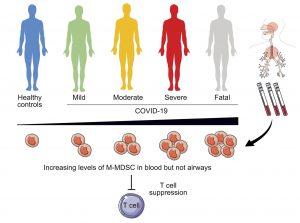SARS-COV-2 causes mild disease in most people, but turns fatal for others. Infection and diseases occur over a wide spectrum ranging from asymptomatic infection to multi-organ failure and death. An improved knowledge of immune responses during COVID-19 is needed to fully understand its pathogenesis and to identify factors that dictate disease severity, as this is relevant for the development of treatment strategies that will prevent COVID-19 mortality.
Myeloid-derived suppressor cells (MDSCs) are myeloid immune cells with an immature phenotype and strong T cell suppressive capacity. Scientists from Karolinska University investigated Monocytic Myeloid-derived suppressor cells (M-MDSCs) in COVID-19 patients across the spectrum of COVID-19 disease and compared this to influenza patients and healthy controls. They used blood and airways of COVID-19 patients across disease severity at multiple time-points. They found a striking association between the frequency of blood M-MDSCs and COVID-19 disease severity. The researchers discovered that purified M-MDSCs isolated from COVID-19 patients were functional and suppressed T cell proliferation and IFNγ production, partly through an Arg-1 dependent mechanism. The plasma Arg-1 levels were elevated in COVID-19 patients in a disease severity-dependent manner. They also found that early frequency of blood M-MDSCs predicted subsequent disease severity, suggesting that M-MDSCs are involved in the dysregulation of the immune response in COVID-19.
They concluded that M-MDSCs may predict disease outcome and that they may be used as a potential prognostic marker in COVID-19 patients.
Journal article: Falck-Jones, S., et al. (2021) Functional monocytic myeloid derived suppressor cells increase in blood but not airways and predict COVID19 severity. Journal of Clinical Investigation.
Summary by Margaret Oluwatoyin Japhet











